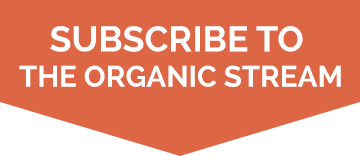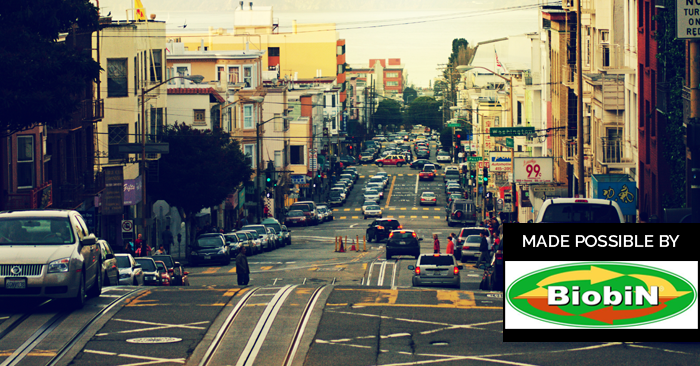#1
10 Dec 2013
"We have all the answers and we have all the techniques. Do we have the will?"
This episode corresponds to Lesson 3 of our course.
In this first episode, we are talking to Robert Reed who represents Recology, a company specializing in resource recovery services in the San Francisco region.
Interview by Eleen Murphy
Thank you to BiobiN for making this episode possible.
BiobiN® is a mobile, on-site organic/wet material management solution that starts the composting process and effectively manages odour from putrescible waste. BiobiN® can be used in a variety of outlets, including food manufacturing, restaurants, shopping centres, supermarkets…it’s endless. Whereever organic or wet materials are generated, BiobiN® is THE solution
EM: Robert you represent Recology, a company based in San Fransisco and specialising in resource recovery services. Could you briefly tell us a little bit more about the company and its activities?
RR: Yes. San Fransisico set a goal of achieving zero waste by 2020, maybe the most ambitious recycling goal that we’re aware of. So we’re doing everything we can to help the city achieve that goal. We’re also an employee-owned company, so the people driving the collection trucks, or working in the recycling plant, or working at the compost facilities all own the company.
EM: Very interesting. I’d like to talk about the so-called organic “waste” generated by our communities around the world. What do you think it takes to change the way these materials are perceived, so that they become valuable in people’s eyes?
RR: Food scraps and plant cuttings, in my mind, are the most important “garbage” there is. That’s where the nutrients are, and that’s where a lot of the carbon is. So we don’t want those materials going to an incinerator to be destroyed. We don’t want those materials going to a landfill where they’ll decompose in an airless or anaerobic environment and produce greenhouse gases – including methane which is a very potent greenhouse gas. You know, all those things came from the earth and they need to go back to the earth. Compost provides farmers a viable alternative to using liquid or chemical fertilisers. So we need to help people understand that, and that composting is a big part of a solution to our environmental challenges. And once people understand that, then they say, “give me a kitchen pale, I want to be part of the solution. I don’t want to send my coffee grounds and peelings to a landfill or incinerator, I want to send it back to the farm.” You know, even the most jaded person who says “why should I do this?” we say “Well geez, do you like fresh peaches? Do you like table grapes and all those good things that they sell at the farmers market?”
“Yes”
“Well you can’t just take away from the organic farm, you have to put something on the farm so they can continue to grow these healthy foods and continue to bring them back to the city, so that they can go onto your table and you can enjoy them and they can support your good health”.
EM: So your main ambition is to educate people?
RR: Yes!
EM: So in San Francisco, are people into recycling? Have people embraced the program?
RR: Yes, most people have embraced these programs. We’re collecting 600 tons a day of food scraps for composting. But you know, if you do a waste characterisation on materials San Francisco are still sending to landfill, you still find 25, 30, 35 percent could be composted. So that tells you we can do a better job and we need to do a better job.
EM: And in addition to improving the soil and our carbon footprint, which we talk about in the lessons on Compostory.org, we often mention that the recovery of organics can benefit local economies. What’s your take on this?
RR: We really need to look at the big picture when it comes to costs, and when you do that, and you’re responsible, you quickly realise that we have to do these things. And by the way, recycling and composting creates many, many jobs and there’s been lots of the reports in the United States in the last two months that we can create tens of thousands of jobs by recycling and composting. Not many people work at landfills, not many people work at incinerators.
EM: Yeah. So are you seeing any trends emerging in the US?
RR: Yes. I think a major development occurred this summer when Michael Bloomberg, the Mayor of New York, announced that New York City was going to establish a food scrap compost program and switch from sending food scraps to landfills and incinerators and instead compost them. And then, you know, Boston Massachusetts and other cities started to get on the bandwagon. We’re starting to get our legs, we’re starting to get momentum, we need more composting facilities. We need more places to take this material.
EM: Definitely. So this is going out to an international audience. Is there any piece of advice you can give to the other communities listening in?
RR: This isn’t rocket science, this isn’t putting a man on the moon. There’s not a tremendous amount of engineering, we have all the answers and we have all the techniques. Do we have the will?
EM: That’s an important question. Any other advice?
RR: It’s important to have face-time with the residents and the businesses in your communities. I mean, it’s very helpful to use all this technology but it’s very important to get in front of people, and one of the things we’re trying to do is have tenant meetings at apartment buildings. We’ve been going to community meetings for years, and talking about recycling and composting. And we tour thousands of people, particularly younger people, through our recycling and composting facilities.
EM: So I presume it gets pretty popular once people realise it’s not, like, the hardest thing to do in the world.
RR: Come on, hard? It’s one of the easiest things to do! I mean you put your bottles, your cans, your paper cups and molded plastic packaging and other things that can be recycled into your recycle bin. It’s just as easy to throw those things in a recycle bin as it is to throw them in the garbage can. You know, participating in urban compost collection program is also extremely easy – thousands and thousands and thousands of people do it every day in San Francisco. They do it at home, they do it at work, they do it when they’re in the coffee shop – you just need the infrastructure.
EM: It’s a no-brainer really.
RR: It’s more than that. We have to do it! It’s not going to be that long before we don’t have enough food to feed everybody. We’re really using our topsoil and we’re losing every year. We can’t continue to just take away, we have to give back to the soil. We have to protect the soil, we have to get it back to the farm.
EM: Exactly. Unfortunately though Robert that’s all we have time for today, but that you for sharing your insights with us. Best of luck with Recology, let’s hope San Francisco reaches its zero waste target by 2020.
RR: We’re going to do everything we can to try to make that happen.


